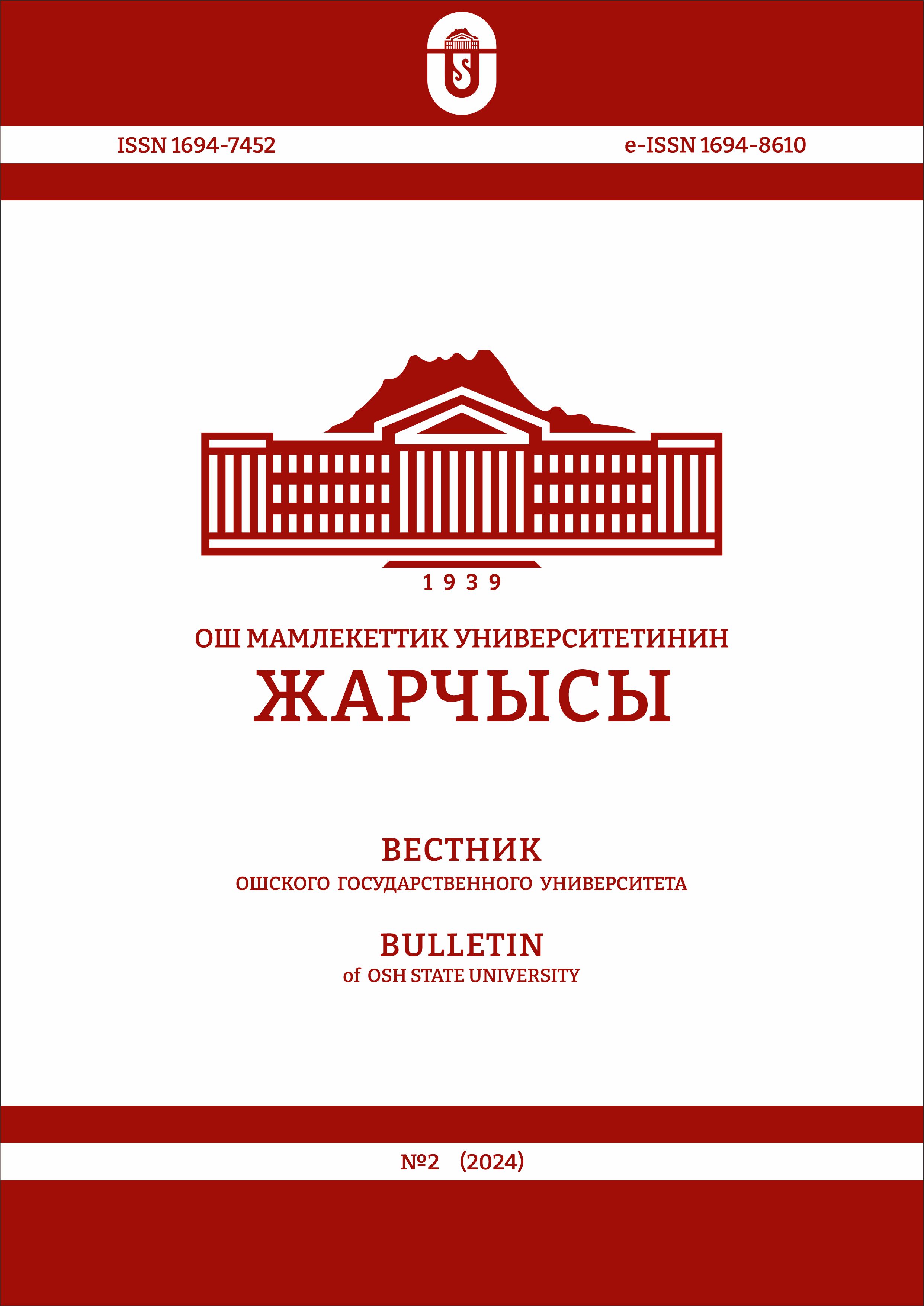ВОПРОСЫ РЕЛИГИОЗНОГО ОБРАЗОВАНИЯ И РЕЛИГИОВЕДЕНИЕ НА ОСНОВЕ В СФЕРЕ РЕЛИГИОЗНОЙ ПОЛИТИКИ КЫРГЫЗСКОЙ РЕСПУБЛИКИ
DOI:
https://doi.org/10.52754/16948610_2024_2_20Ключевые слова:
религиозное образование, религиоведение, школы, медресе, политика религиозного образования, теологияАннотация
С момента обретения независимости Кыргызстан предоставил свободу религиозному образованию. Благодаря этой свободе во всех регионах Кыргызстана были открыты религиозные образовательные учреждения. В Кыргызстане религиозно-просветительскую деятельность проводят в основном представители 2-х религий ислам и христиане. В сфере религиозное образование основном преимущество преобладает ислам. В 1991 году было открыто медресе имени Хазрата Умара, давшее первое в Кыргызстане религиозное образование. После этого в регионах открылись религиозные образовательные учреждения, известно, что данное время их число превышает более 300. В первые годы независимости в школах был введен урок религии, и имам этого села приходил и проводил специальный урок о религии и вере один раз в неделю. Позже имамы, проводившие уроки в школах стали вмешиваться одежду и походкам школьных учителей, эти случаи кое-где вызвали резонанс, в результате чего имамы вытеснены от урока по требованию директоров школ. На основании решения, принятого на заседании Совета обороны, состоявшемся в феврале 2014 года, был поднять вопрос религиозного образования и урока религиоведения. В итоге была поставлена задача организовать единую учебную программу и содержание религиозных предметов учебных заведений исламской направленности в соответствии с современными требованиями. Также введение уроков, связанных с религиоведением, в государственных средних школах. С 2016 года в некоторых школах в пилотном порядке введен предмет «История культуры религий». После смены власти в 2020 году с 2021 года во всех школах был введен и преподается предмет «История развития религий». В этой статье мы анализируем вышеупомянутые проблемы.
Библиографические ссылки
Азаттык радиосу. 2016 год 23 февраля. Кыргызская служба. http://www.azattyk.org/content/kyrgyzstan_religion_security/27568626.html (кайрылган датасы: 16.11.2023)
Бирдиктүү окуу планы. https://muftiyat.kg/birdiktuu-programma/ (кайрылган датасы: 15.12.2023)
Кыргыз Республикасынын 2014-2020-жылдардагы дин чөйрөсүндөгү саясатынын концепциясы. (11-ноябрь 2014-жылы Коргоо Кеңешинин отурумунда бекитилген)
Кыргыз Республикасынын Билим берүү, илим жана маданият министрлигинин 2000-жылдын 29-декабрынан №752/1 буйругу менен жогорку профессионалдуу билим берүүнүн адистиктери жана даярдоо багыттарынын тизмеси http://cbd.minjust.gov.kg/act/view/ru-ru/31723 (кайрылган датасы: 17.11.2023)
Кыргыз Республикасынын Конституциясы 11-апрель 2021-жылы жалпы элдик референдумда кабыл алынган.
Мамаюсупов О. (2004) “Религиозная ситуация в Кыргызской Республики”, //Сборник материалов международной конференции «Ислам в Центральной Азии». –Ош, 20-22 май 2004.
Муфтияттын официалдуу сайты https://muftiyat.kg/maalymat/ (кайрылган датасы: 23.10.2023).
Шеров Ш. Тарых и.к. алуу талабына үчүн жазылган диссертация lib.kg/kyrgyzskij-sherov-shajyrbek-bijzhanovich-kyrgyzstandagy-dinij-islamdyk-bilim-ber-n-n-t-z-l-sh-abaly-zhana-k-jg-jl-r-1991-2010-zhzh/
Шеров, Ш.Б. Жалпы орто билим берүү мекемелерге "дин маданиятынын тарыхы" сабагын киргизүүдөгү көйгөйлөр / Ш. Б. Шеров, К. А. Таиров // Вестник Ошского государственного университета. – 2021. – Vol. 2, No. 3. – P. 109-113. – DOI: 10.52754/16947452_2021_2_5_109. – EDN: FHQZDK. DOI: https://doi.org/10.52754/16947452_2021_2_5_109
Kozukulov T., (2010). Günümüz Kırgızlarda Din Anlayışı ve Fenomenleri. //Uluslar Arası Türk Dünyası Din Anlayışları Sempozyum, 4-6 Kasım 2010.
Kozukulov T., (2015). Kirgizistan’da dini kurumsallaşma ve toplum.// Ağrı universitesi sosyal bilimler dergisi. Ağrı. №1
Kozukulov T., (2015). Kırgız Toplumununu Dini Aydınlatma Meselesinde Din Eğitiminin Rölü Ve Ona Etki Eden Yerel Ve Dış Faktörler.// III. Uluslararası KOP Bölgesel Kalkınma Sempozyumu Bildiri Kitabı.
Загрузки
Опубликован
Как цитировать
Выпуск
Раздел
Лицензия
Copyright (c) 2024 The Author(s)

Это произведение доступно по лицензии Creative Commons «Attribution-NonCommercial» («Атрибуция — Некоммерческое использование») 4.0 Всемирная.



